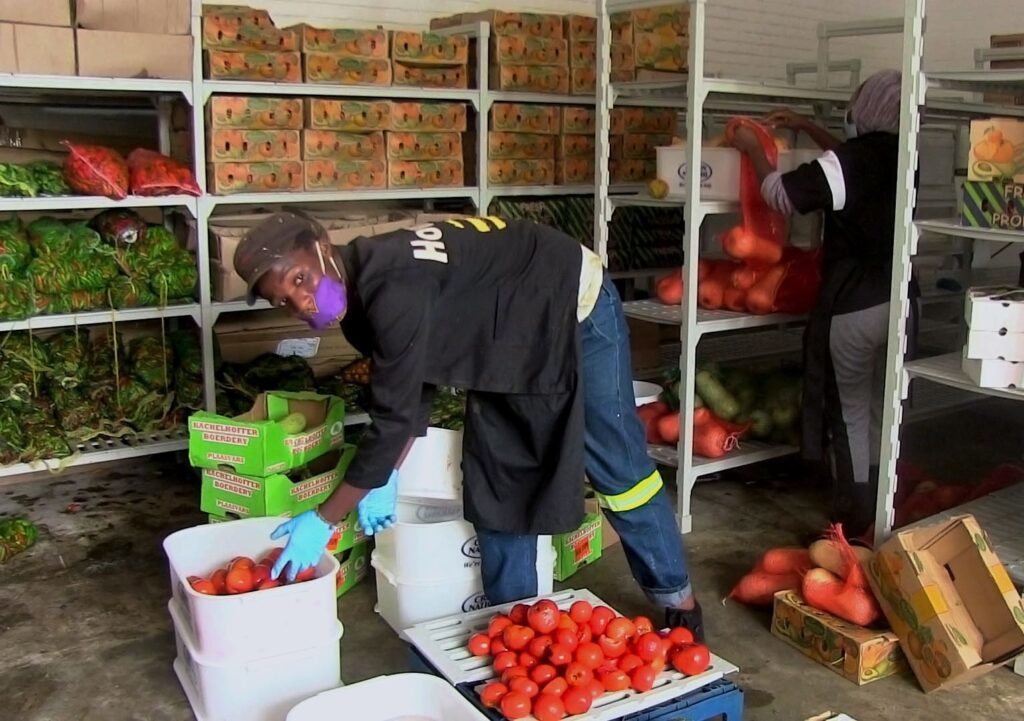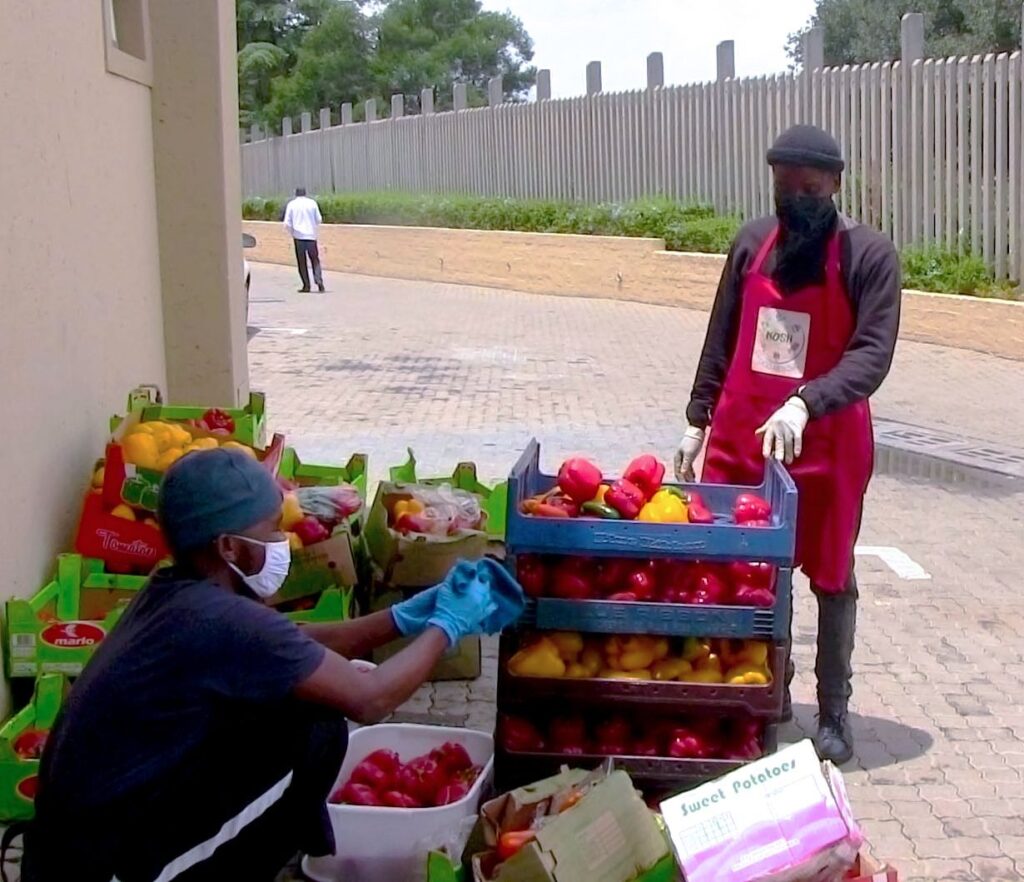“It gives all of us, and especially the guys and my co-group around me, a great sense of pride and a great sense of satisfaction knowing that we have made a difference in so many lives and we have saved so many people from the brink of hunger and starvation,” she said.
The food-rescuing, compassionate chefs

By Bongani Siziba, bird story agency
Around midday, the kitchen in Nishaan and Charmaine Kishore’s house in Johannesburg fills with boxes of foodstuffs. The smells of food being prepared permeate the air.
In an open area, long tables are covered in sandwich-making supplies and a woman volunteer is busy entering data on a poster board hanging on the wall.
This activity is mirrored in other kitchens across Johannesburg. The sounds and smells of food being fried by off-duty chefs and then packaged for delivery are all part of a larger scheme to make the food industry more responsive and to ensure that as many hungry South Africans as possible, receive a daily meal.
Yejna Maharaji, a member of the South African Chefs Association and coordinator for the project, said that the 300 chefs involved were primarily attracted by the “giving back” opportunity the initiative offered.
Johannesburg chefs are volunteering to feed the hungry and prevent food waste. It’s a win-win for humanity and the environment.
“It gives all of us, and especially the guys and my co-group around me, a great sense of pride and a great sense of satisfaction knowing that we have made a difference in so many lives and we have saved so many people from the brink of hunger and starvation,” she said.
The volunteers use fresh products nearing their expiry date, supplemented with other wholesome and nutritious ingredients.
The mission of Chefs of Compassion (CoC) began when COVID-19 struck in 2020. It has since turned into a life-saving initiative involving hundreds of chefs and other volunteers.

Nishaan Kishore, the founder of Infinity Foundation, which partners with CoC, said their organization makes an average of 2,000 sandwiches and other warm meals daily, which are then loaded onto trucks and delivered to needy communities around Johannesburg.
“We have the food that must reach and feed the hungry in any area. Sometimes it is difficult, one house here, one house there,” said Kishore.
The food is also available for pick up by those living in the surrounding areas and the chefs and other volunteers work in shifts to ensure everything runs smoothly.
On this particular day, Noxolo Mtimane and two of her friends are in the kitchen collecting food. They have come to collect 300 meals to take to two townships in Germiston, fifteen kilometres from Johannesburg and South Africa’s sixth-largest city.
“Since we haven’t gotten much help in our communities, so many families are going to bed on empty stomachs, and that is why we are here to collect food parcels for them,” says Mtimane.

Volunteers rescue food from the Joburg Produce Market – the city’s biggest vegetable and fruit market – as well as from local farmers, food manufacturers, wholesalers, and retailers and take it to a share house near the produce market in City Deep for sorting, to ensure that only good quality food reaches the Chefs with Compassion kitchens.
From the food collected at City Deep, the chefs cook soup and other meals to distribute in communities where there are needy.
The group now has 29 beneficiary organizations, ensuring that the cooked and prepared food is spread as far as possible.
The chefs’ work has an impact beyond the food deliveries, however. Much of the food that is rescued for use in the chefs’ kitchens would otherwise have gone to waste.
Austin Nxumalo, a volunteer chef, explained how he sorts vegetables at the market.
“Every day, I come here to help; l am a trained chef but l am doing my best to make sure l do good for my community,” he said.
“All the veggies you see here, l make sure, are sorted and fit for human consumption. For example, if you look at these tomatoes, some of them are good and others bad. So, we sort them out in such a way that you can eat them,” Nxumalo added.
The 2021 Global Report on Food Crises by the Global Network Against Food Crises highlights that close to 11.8 million South Africans face food scarcity. The Covid-19 pandemic exacerbated this situation, jolting volunteers into action.

The Food and Agriculture Organisation report – Global Initiative on Food Loss and Waste – defines food waste as “the discarding or alternative (non-food) use of food that was fit for human consumption”. The report further indicates that an estimated 30 per cent of cereals, 40 to 50 per cent of root crops, fruits and vegetables, 20 per cent of oilseeds, meat and dairy products, and 35 per cent of fish go to waste annually.
The trends are blamed on consumer behaviour, policies, and regulations gaps. In Africa, food wastage is occasioned by managerial and technical limitations at the harvesting, storage, transportation, processing, packaging, and marketing stages.
For instance, the World-Wide Fund for Nature South Africa (WWF-SA) estimates that South Africa dumps nearly 9 million tonnes of food annually.
Sebischwe Juma is one of the volunteers. He is also the founder of Malaika Orphanage. On this day, he stirs a giant paella pan, five feet in diameter, which holds enough to feed 500 people.
“This batch,” Sebischwe explains in the Chichewa language, “contains 12 ingredients, including little potatoes, veggies, black beans, red beans, and some carrots.”
Malaika Orphanage is in Hillbrow, close to the centre of Johannesburg, where some 200 hundred beneficiaries, – children and adults – receive a daily meal from the Chefs of Compassion.
“These food parcels are helping us a lot. There are days when we used to sleep hungry but not anymore. Every day we go to the community centre to eat. They also give us food parcels every week. We are grateful to them,” said Mzoxolo Ngubane, a beneficiary and an orphan, who lives with her three siblings in Johannesburg South.
The logistics behind the program are complex as there is a growing need to increase the reach and attract more volunteers.
For Charmaine Kishore, the initiative addresses a real need and she is determined to keep using her chef’s skills to support the program.
“The pain that I saw within those people really motivated me to carry on… and there’s going to be no stopping this cooking as far as I’m concerned,” Kishore asserted.
Since the initiative started in March 2021, over 3 million meals have been served, inspiring many more volunteers to get involved.
bird story agency





